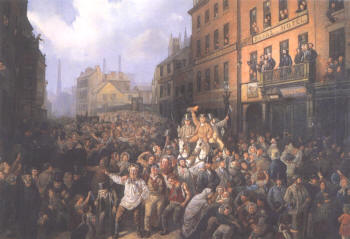In the first half of the nineteenth century, the answer was all-too-often by subdividing existing property and cramming more accommodation into backyards. Cities became more densely packed, with many dead-ends, foul alleys and damp cellars offering miserable accommodation.
Parliament reformed municipal government in 1835, but this did little to help. Corporations were now elected, but the voters were narrow-minded, self-interested owners of small property. Many towns voted for cheap government, with low spending on drains or water supplies. Attempts by central government to force towns to take action were denounced as despotic interference in local liberties, an attack on 'constitutional government'.
 |
The Preston By-Election of 1862. |